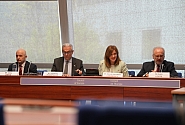
To mark the 30th anniversary of Latvia’s accession to the Council of Europe, a high-level debate “Democracy in Danger” took place on Tuesday, 8 April, during the Parliamentary Assembly of the Council of Europe (PACE).
In a discussion chaired by Zanda Kalniņa-Lukaševica, Deputy Speaker of the Saeima and Head of the Latvian delegation to PACE, participants Theodoros Rousopoulos, President of PACE; Egils Levits, President of Latvia (2019-2023) and former judge of the European Court of Human Rights; and Jānis Sārts, Director of NATO Strategic Communications Centre of Excellence, explored the threats to democracy and the necessary actions to protect it.
Opening the discussion, Kalniņa-Lukaševica underscored the role of novel technologies in the new era and the risks they pose for democracy as well as the potential for protecting it.
“We are living through a time that future historians will evaluate and analyse. After all the historical struggles, Latvia has gained independence and security and restored democracy, but today we are once again facing new, much more insidious threats—information warfare and technologies used against us,” stressed Kalniņa-Lukaševica, the initiator of the discussion, addressing the audience.
In his introductory remarks, Rousopoulos highlighted Latvia’s achievements and contribution to the ongoing work to defend democracy. He pointed out that democracy has already been under threat in the past and there have been discussions and fights about it from time to time, but new technologies have created new threats, namely, information warfare.
Levits warned that the core values of Western societies—openness, equality, and justice—are being cynically abused to undermine democracy from within. He drew particular attention to the massive manipulation of public opinion by movements hostile to democratic societies. Levits also pointed out that social platforms are used to disseminate the political views of their owners, undermining diversity of opinion. He stressed that in times of democratic crisis, it is necessary to defend one’s values, and the Council of Europe is an organisation that can do this.
Sārts outlined the technological developments prevailing in the world, recalling that circulation of information and discussion are the backbones of democracy. Sārts highlighted the prominent role of artificial intelligence technologies and their potential both as a threat and an opportunity to be seized. Sārts drew the attention of the politicians present to the need for European countries to invest in AI and other digital innovations. He warned that AI dominance is a few years away and we are now faced with the choice of whether to allow AI technologies to develop unchecked as social media once did.
“At a time when democratic values were all but taken for granted in the Western world, they have been attacked by undemocratic regimes. Values that built the prosperity of the West are now used as a weapon against democracies themselves. We must therefore be vigilant and stand up for what we truly believe in,” said Kalniņa-Lukaševica concluding the debate. She pointed out that European democracies do not have much time to prepare an adequate “shield” to protect their core values, and that work on legal and technological solutions should therefore be urgent.
A recording of the debate is available at: https://ej.uz/Democracy_In_Danger
Saeima Press Service







